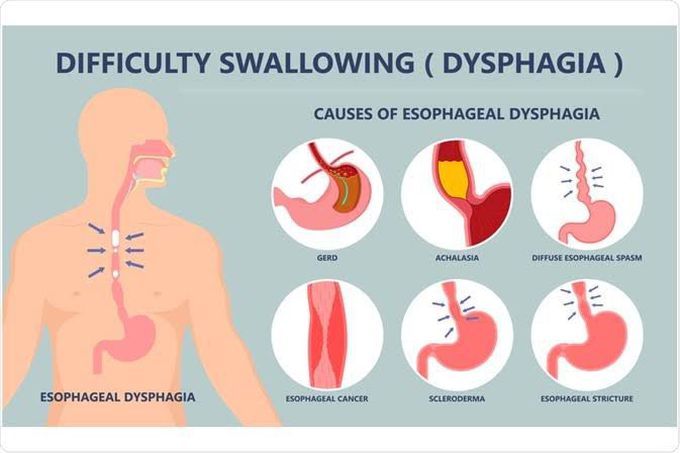


Causes of dysphagia
Swallowing is complex, involving many muscles and nerves. Any condition that weakens or damages the muscles and nerves used for swallowing or leads to a narrowing of the back of the throat or esophagus can cause dysphagia. Dysphagia generally falls into one of the following categories. Esophageal dysphagia Esophageal dysphagia refers to the sensation of food sticking or getting caught in the base of your throat or in your chest after you've started to swallow. Some of the causes of esophageal dysphagia include: Achalasia. When the lower esophageal muscle (sphincter) doesn't relax properly to let food enter the stomach, it can cause food to come back up into the throat. Muscles in the wall of the esophagus might be weak as well, a condition that tends to worsen over time. Diffuse spasm. This condition causes high-pressure, poorly coordinated contractions of the esophagus, usually after swallowing. Diffuse spasm affects the involuntary muscles in the walls of the lower esophagus. Esophageal stricture. A narrowed esophagus (stricture) can trap large pieces of food. Tumors or scar tissue, often caused by gastroesophageal reflux disease (GERD), can cause narrowing. Esophageal tumors. Difficulty swallowing tends to get progressively worse when esophageal tumors are present due to narrowing of the esophagus. Foreign bodies. Sometimes food or another object can partially block the throat or esophagus. Older adults with dentures and people who have difficulty chewing their food may be more likely to have a piece of food become lodged in the throat or esophagus. Esophageal ring. A thin area of narrowing in the lower esophagus can cause difficulty swallowing solid foods off and on. GERD. Damage to esophageal tissues from stomach acid backing up into the esophagus can lead to spasm or scarring and narrowing of the lower esophagus. Eosinophilic esophagitis. This condition, which might be related to a food allergy, is caused by too many cells called eosinophils in the esophagus. Scleroderma. Development of scar-like tissue, causing stiffening and hardening of tissues, can weaken the lower esophageal sphincter. As a result, acid backs up into the esophagus and causes frequent heartburn. Radiation therapy. This cancer treatment can lead to inflammation and scarring of the esophagus. Oropharyngeal dysphagia Certain conditions can weaken the throat muscles, making it difficult to move food from your mouth into your throat and esophagus when you start to swallow. You might choke, gag or cough when you try to swallow or have the sensation of food or fluids going down your windpipe (trachea) or up your nose. This can lead to pneumonia. Causes of oropharyngeal dysphagia include: Neurological disorders. Certain disorders — such as multiple sclerosis, muscular dystrophy and Parkinson's disease — can cause dysphagia. Neurological damage. Sudden neurological damage, such as from a stroke or brain or spinal cord injury, can affect the ability to swallow. Pharyngoesophageal diverticulum (Zenker's diverticulum). A small pouch that forms and collects food particles in the throat, often just above the esophagus, leads to difficulty swallowing, gurgling sounds, bad breath, and repeated throat clearing or coughing. Cancer. Certain cancers and some cancer treatments, such as radiation, can cause difficulty swallowing.
I’ve been living with Parkinson’s disease for quite some time, and for years, I struggled to find lasting relief. While medications offered some temporary help, the symptoms always returned and often worsened.Out of a mix of hope and hesitation, I decided to try an herbal treatment program from NaturePath Herbal Clinic. I’ll admit, I was skeptical at first. But around the fourth month, I began to notice real, steady progress.my tremors became less frequent the stiffness in my body eased My balance and coordination gradually improved It wasn’t an overnight transformation, but it was consistent and life changing. For the first time in years, I feel more in control of my body. I can move with greater freedom, sleep more peacefully, and enjoy daily activities without the constant discomfort I once accepted as normal.The improvement I’ve experienced physically, emotionally, and mentally has been nothing short of upliftings.If you're exploring natural options for managing Parkinson’s, I wholeheartedly recommend looking into NaturePath Herbal Clinic. Their approach has made a real difference in my life, and I’m truly grateful I gave it a chance. www.naturepathherbalclinic.com info@naturepathherbalclinic.com


